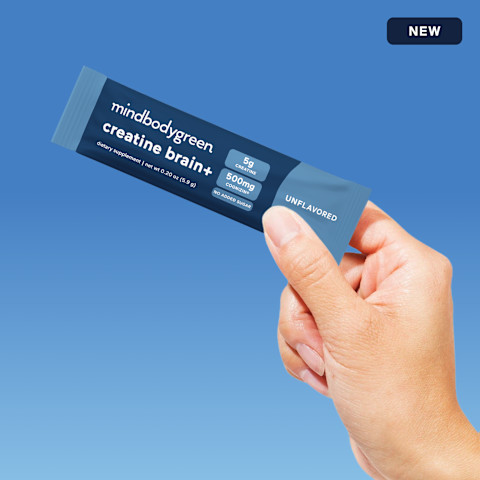8 Expert-Backed Ways To Take Better Care Of Your Brain (& Signs You Need To)

Navigating the realm of brain health can feel like decoding a cryptic message—how do you know when your brain needs a little extra TLC?
While it's easy to spot when your stomach grumbles or your skin cries out for attention, deciphering the signs of a brain in need isn't always as straightforward.
From fluctuations in mood to foggy thinking and restless nights, the clues can manifest throughout your entire being.
So, regardless of how old you are, prioritizing the care of your brain should be at the top of your to-do list. Here, a few ways to nurture this complex organ.
Supporting your brain throughout life
Regardless of what stage of life you're in, it's essential to nurture your brain. Brain health involves cognitive function, mental resilience, emotional regulation, and myriad other facets of mental well-being.
Whether it's a weekly crossword, a daily Wordle, or a brain-boosting nootropic supplement, there are many ways to give your brain extra love.* And when your brain is happy, you'll be happy.
Dean Sherzai, M.D., and Ayesha Sherzai, M.D., neurologists and program directors at Loma Linda University, advise homing in on different aspects of your cognitive function at various ages:
- Your attention in your 20s
- Your memory in your 30s
- Your executive functioning in your 40s and beyond
Supporting your brain health can also mean taking time to socialize and see loved ones regularly. Finding purpose and connecting with others, especially in later years, is a core component of the lifestyles of the longest-living people in Blue Zones. Isolation1 is unfavorable to mental well-being and overall brain health.
So, how can you tell if your brain is healthy? Your body could be telling you your brain needs a little extra love, and you might not even know it.
Here are some signs that you might need to be more intentional about supporting your brain.
11 signs you need to take better care of your brain
- You forget things more often than you'd like.
- You're having trouble making decisions.
- You haven't been able to connect as much with your favorite people.
- Your sleep has been suffering.
- You get frustrated easily.
- You're feeling a little more sensitive than usual.
- You crash midday.
- Your motivation has been low.
- Thinking just feels harder.
- You can't focus.
- You're struggling to manage your stress effectively.
Many of these signs are related to mental well-being. After all, mental health is not an isolated area; it is brain health. Luckily, there are always things we can do to better support our brain biology and cognitive performance.
8 ways to nurture your brain health
"Your brain function is a marker of health, so when your brain isn't working right, the first thing to do is go back to the foundations: what you're eating, how you're exercising, and how well you're connecting with others and fulfilling a purpose in life," shares functional medicine practitioner Stacie Stephenson, D.C., CNS.
Let's look at some of these foundations and other specific ways we can nurture our brains:
Eat brain-supporting foods
Try adding more brain-supporting nutrients—like omega-3 fatty acids (especially EPA and DHA), B vitamins, vitamin D, and vitamin C—to your diet to optimize your cognitive function and promote mental well-being. Foods like fatty fish, leafy greens, dark chocolate, and even rosemary can provide micronutrients and phytonutrients you need to foster a healthy brain.
To add some flavor to your brain foods, check out nutritional psychiatrist Uma Naidoo, M.D.'s favorite brain-supporting sauces (which include curry leaf and carrot yogurt sauce, a miso sauce, and kale and walnut pesto).
Take a brain-supporting supplement
That's right: Certain supplements also support brain health. Two such ingredients include creatine and citicoline. While creatine's claim to fame has been it's muscle building capabilities, creatine actually works in the body by acting as an energy reserve. And, it also helps the brain generate energy2 more efficiently during challenging cognitive tasks or during times of stress (like after sleeping poorly).* Studies show it supports memory, especially for those who are 50+.*
Citicoline is a naturally occuring brain chemical involved in energy production. It's also available as a supplement, and studies show supplement specifically with Cognizin® citicoline improves processing speed, attention span, and mental energy.*
So what's the best way to get these two nutrients? mindbodygreen's creatine brain+. Each serving of this powder combines 5 grams of creatine monohydrate and 500 milligrams of Cognizin® citicoline to support your brain and cognitive health.*
Get adequate sleep
Your brain needs time to rest and recharge too. While you sleep, your brain repairs its cells and updates your memories. When it comes to brain health, neuroscientist and author of The Source Tara Swart, M.D., Ph.D., sees sleep as more important than diet, exercise, hydration, and meditation.
Move your body
Your movement doesn't have to be major! A simple five-minute break of stretching, jumping jacks, or walking a lap around your house improves brain health3, a 2020 study of university students found.
In fact, five minutes is more than you need! Jennifer Heisz, Ph.D., neuroscientist and author of Move the Body, Heal the Mind, says two minutes of movement after 30 minutes of sitting is all it takes to re-oxygenate the brain and get those vital nutrients flowing back into it.
According to Stephenson, exercise also increases the levels of a memory-improving protein4 in your brain. "When you exercise, you release BDNF (that's brain-derived neurotrophic factor), which has a revitalizing effect on neurons and improves brain function as well as mood," she says.
Challenge your brain
Here's your sign to start doing more puzzles and playing more games (yes, really!). Completing crossword and number puzzles is particularly beneficial for older adults, but anyone that does them regularly will experience better memory, reasoning, and attention. Incorporating more brain-healthy activities into your schedule is as simple as Tuesday-night Scrabble games and early mornings with a new book.
Meditate
We've all become more aware of the incredible benefits of meditation, but this mindfulness practice doesn't just help keep you calm—it supports your brain health too. A 2011 Psychiatry Research study found that gray matter concentration increased5 in participants' brains after just eight weeks of meditation.
Think yourself younger
Sergey Young, longevity expert, founder of the Longevity Vision Fund, and author of The Science and Technology of Growing Young, believes that thinking you're younger helps your body work better. And, he's right.
A 2018 Frontiers study found that people who felt younger than their biological age had more gray matter6 in their brains. Young recommends trying this morning mantra: "I'm going to live for 200 years in a 25-year-old body and mind."
Connect with others
Finding connection and purpose is more important to brain longevity than you might think. "A happy, supported, fulfilling life with strong social connections and meaningful work has been proven to contribute to a healthy brain. When you feel happy, fulfilled, and loved, and you have a purpose and a reason to get up in the morning, your brain will thrive," Stephenson shares.
The takeaway
Supporting your brain health through all the stages of your life is important. But proactively caring for your brain doesn't have to be complicated.
In fact, it might be the most fun part of your body to care for—especially when nurturing your cognitive health means more puzzles, games, time with friends and family, and youthful morning mantras.
6 Sources
- https://pubmed.ncbi.nlm.nih.gov/25866548/
- https://pubmed.ncbi.nlm.nih.gov/39792585/
- https://www.sciencedirect.com/science/article/abs/pii/S2211368116301929
- https://pubmed.ncbi.nlm.nih.gov/17414812/
- https://www.ncbi.nlm.nih.gov/pmc/articles/PMC3004979/
- https://www.frontiersin.org/articles/10.3389/fnagi.2018.00168/full

